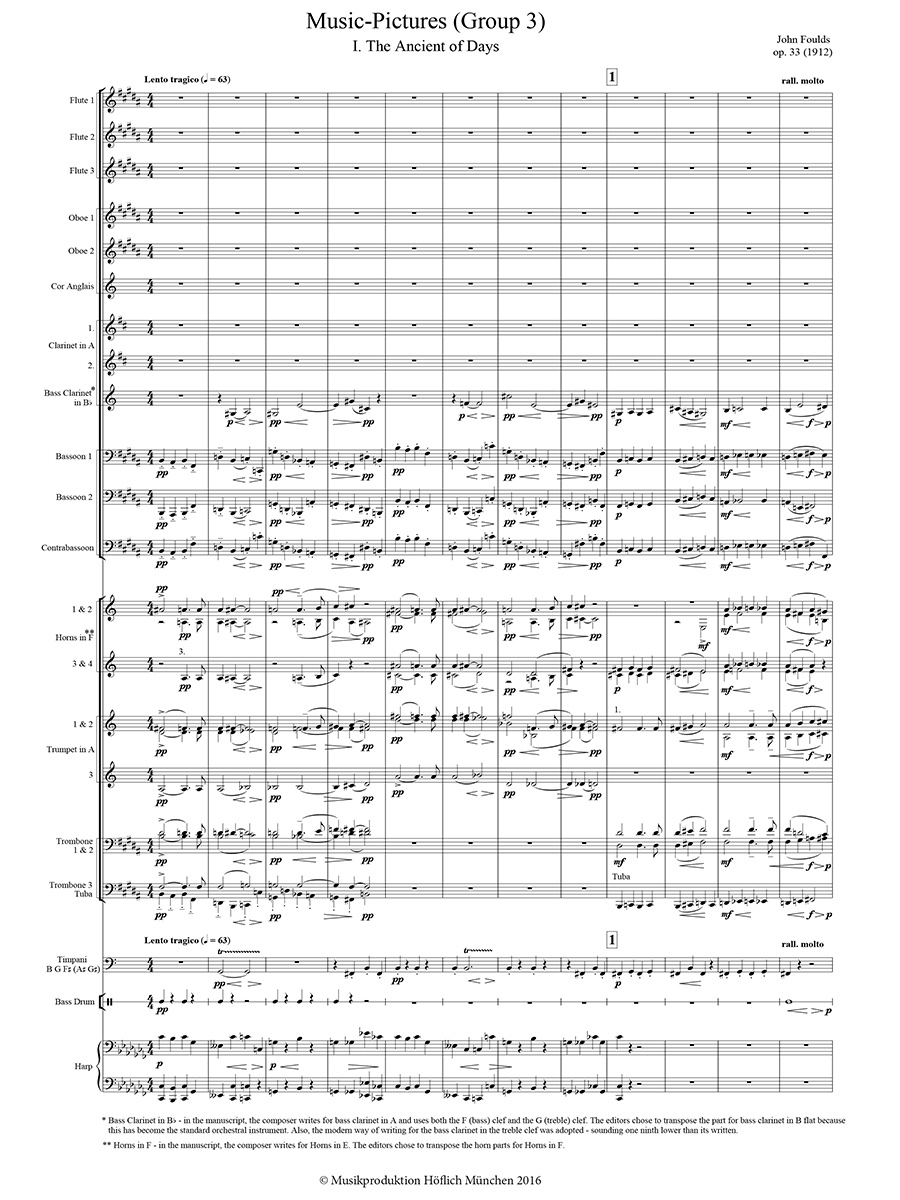Music-Pictures (Group 3) Op. 33 for large orchestra (1912) (first printed edition / edited and engraved by Lucian Beschiu)
Foulds, John
34,00 €
Preface
John Herbert Foulds
Music-Pictures (Group 3) op. 33 (1912)
(geb. Manchester, 2. November 1880 – gest. Kalkutta, 25. April 1939)
I ‚The Ancient of Days’ after William Blake. Lento tragico (p. 1) – Adagio (p. 4) – Tempo primo (p. 5)
II ‚Colombine’ after Brunet. A Study in full-tones, half-tones, and quarter-tones. Allegretto senza deviazione (p. 10)
III ‚Old Greek Legend’ (in the Phrygian Mode) after Martin. Adagio misurato (p. 27) –
Andante alla marcia (p. 28) – Adagio come prima (p. 38)
IV ‚Tocsin’ after Boutigny. Allegro preciso (p. 40)
John Foulds is, to my mind, perhaps the greatest twentieth-century composer of genius to be entirely ignored, not only in England, but altogether. His wholly original music exudes freedom, lightness, immediacy, and a joy of discovery capable of touching and thrilling the listener in a unique way. Foulds was at once a pioneer, a true adventurer, a comprehensive master of form, a vivacious practicing musician as a conductor, cellist, and pianist, an insatiable explorer, a prime example of unlimited stylistic versatility, a tireless innovator, and the possessor of a critical and free-thinking mind. Above all he was a man who always strove for the utmost while remaining ever cognizant of his human inadequacy. This lent him a natural modesty and enabled him to come closer and closer to his actual goal of reaching absolute freedom, of being an “enlightened one.” He found the crucial elements for his quest in Eastern culture, as handed down by the “masters of wisdom” in Central Asia and India, and sought to combine them with constructive elements of Western culture to fashion a higher unity. None of the personal setbacks and the tragic sides of his life are imposed on the listeners of his music, which invariably speaks a warm-hearted, unsentimental, and authentic language.
John Herbert Foulds was born in Manchester on 2 November 1880 as one of four children of a professional bassoon player. His ancestors were French-based Jewish bankers, one of whom, Achille Fould, rose to become Minister of Finance under Napoleon III. Foulds’s own family had little money, but indulged all the more in music, for which John revealed an early gift. He began to take piano lessons at the age of four, after which he switched to the oboe before making the cello his main instrument. His earliest compositions were produced at the tender age of seven. Little is known about him in these years except that his childhood was not very happy. He ran away from home at the age of thirteen, becoming a professional orchestral musician and undertaking journeys that took him as far afield as Vienna, where he met Bruckner. In 1900 he joined the Hallé Orchestra during it legendary period under Hans Richter.
Read full preface / Komplettes Vorwort lesen > HERE
Score Data
| Score No. | 1809 |
|---|---|
| Special Edition | Foulds Edition |
| Genre | Orchestra |
| Size | 225 x 320 mm |
| Performance materials | available |
| Size | 225 x 320 mm |
| Printing | First print |
